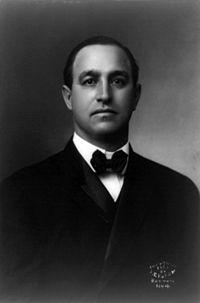John Mitchell (United Mine Workers)
| John Mitchell | |
|---|---|
 |
|
| Born |
February 4, 1870 Braidwood, Illinois, U.S. |
| Died | September 9, 1919 (aged 49) New York City, New York, U.S. |
| Nationality | American |
| Occupation | Labor leader, civil servant |
| Known for | President, United Mine Workers of America |
John Mitchell (February 4, 1870 – September 9, 1919) was a United States labor leader and president of the United Mine Workers of America from 1898 to 1908.
John Mitchell was born in 1870 in Braidwood, Illinois, a second generation Irish immigrant. He became an orphan when he was only six years old, and began working at that age to support his family. He worked in the coal mines his whole life. When he was fifteen years old, he joined the Knights of Labor in 1885 and was a founding member of the United Mine Workers of America in 1890. He was elected District 12 secretary-treasurer in 1895. He was made an international union organizer in 1897 and worked alongside Mary Harris "Mother" Jones before being elected an international vice president the same year.
In September 1898, Mitchell became acting president of UMWA after president Michael Ratchford resigned to become a member of the United States Industrial Commission. He won election outright in 1899. He helped organize the National Civic Federation in 1900. He served as fourth vice president of the American Federation of Labor (AFL) from 1898 to 1900, and as second vice president from 1899 to 1913 (although he had lost the UMWA presidency in 1908).
Along with AFL Samuel Gompers and AFL secretary-treasurer Frank Morrison, he was sentenced to prison for violating a court injunction during a strike at the Buck Stove and Range Co. in St. Louis, Missouri. In a landmark case, the United States Supreme Court overturned the contempt citation in Gompers v. Buck's Stove and Range Co., finding that the court of appeals had erred in allowing the company to bring the complaint of contempt, rather than the district court itself. One of Mitchell's earliest challenges in the UMWA was to help incorporate new workers from various ethnicities into the union. There were numerous language barriers, as well as cultural biases and outright prejudice to be overcome. His success in this area helped him become vice-president in 1897, and president one year later, in 1898.
...
Wikipedia
